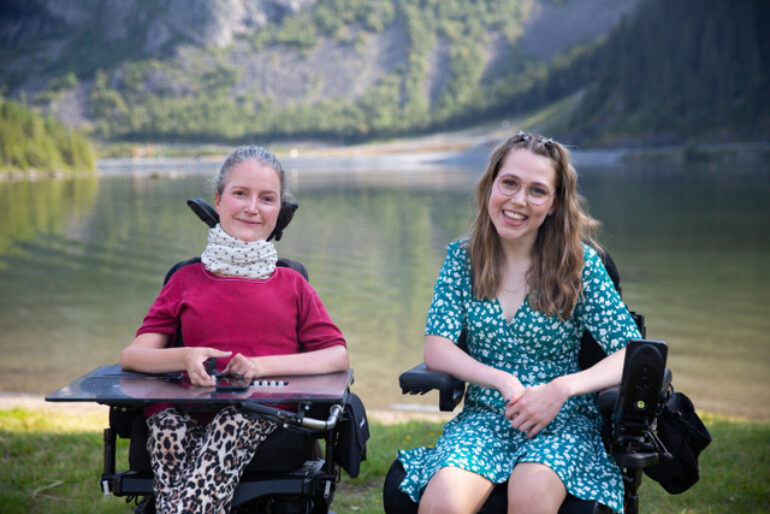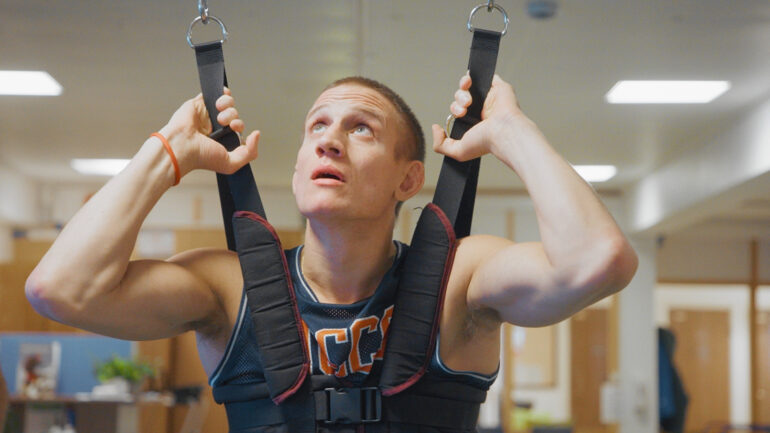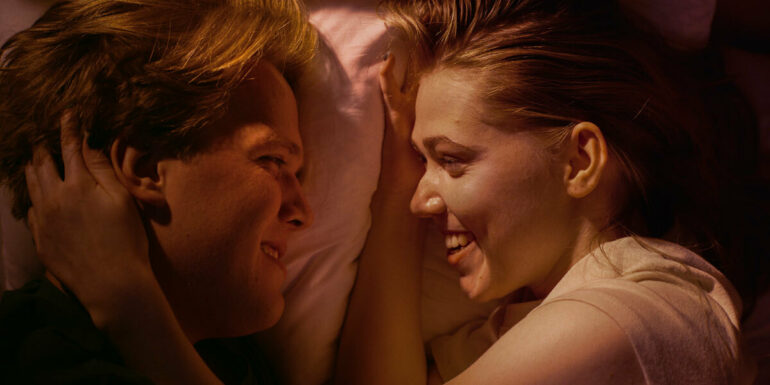Written by: Geoffrey Macnab
12.06.25
Why are so few films made in the Nordic countries in which disabled people are able to tell their own stories? Some see signs of systemic discrimination.
In a hard-hitting interview, 39-year-old Norwegian filmmaker Mari Storstein, whose debut feature My First Love (Min første kjærlighet) will premiere later this year, has claimed that stories featuring disabled people, or told by them, are currently “almost completely missing from the screen” in the Nordic countries.
Disabled people are estimated to count for between 15 and 20% of the population of the Nordic countries. And yet, Storstein alleges, they are facing systemic discrimination within the film industry.
“The truth is that our voices are being silenced, and this has to change. The film industry needs to actively prioritise telling our stories, it will not be fully equal before our stories are heard; the industry needs to lead the way and help create that equality,” the wheelchair-bound director told Nordisk Film & TV Fond. ”I’ve been told by people with power in the film industry that the talent doesn’t exist. That is simply wrong.”
The portrayals of disabled protagonists that do reach the screen, she added, tend to be “one-dimensional and stereotypical”, because they are based on “myths and internalised prejudices”.
“Ableism often appears in the form of low expectations and assumptions about what I can or cannot do. When I applied for funding for My First Love, I received rejections that clearly revealed a lack of awareness. The film was described as something that would only interest disabled audiences, and my competence was questioned,” she continued.
Storstein acknowledged that she has “seen a gradual increase in awareness around disability representation”, but observed that “when diversity in film is discussed, we’re still often excluded. We’re frequently not even viewed as part of that conversation. So; there’s still a long way to go for disabled filmmakers.”
The director argues that talent development programmes need to be overhauled if they are going to make any practical difference.
“When higher education is required, but disabled people are consistently excluded from education, the barrier becomes systemic. We need flexible application processes, and we need to invest in talent development and mentorships specifically designed to bring disabled storytellers into the industry.”
For anything to change, the director suggested, “disabled people must be involved in the creative leadership — writers, directors, actors, consultants. We also need to move beyond just telling stories of heroes or victims. We need to show ordinary, extraordinary people who love and hate, and live full, complicated lives.”
Norwegian filmmaker Mari Bakke Riise, who co-directed Fighter with Sunniva Sundby, has been encouraged by the feedback to the film, also sold by TrustNordisk. This is the story of MMA fighter Geir Kåre Nyland struggling to rebuild his life after an accident leaves him wheelchair bound.
“It has actually been overwhelming,” Riise said of audience reactions to the film since its premiere at CPH: DOX. “When we made the film, we felt it could shed a light on people with disabilities but what we have seen is that it has reached out to so many people we didn’t expect could relate to this at all…it reaches both women and males. It reaches very wide.”
When the 3 x 42 minute TV version of the film screened recently on TV 2 in Norway, it had an audience of 500,000 - and 97% watched right to the end. Fighter has also been invited to several international festivals (including Series Mania) and has sold widely.
Audiences, Riise said, “forget about the wheelchair and think about the person” as they watch the film.
Contacted by Nordisk Film & TV Fond, representatives of several Nordic film agencies and film institutes defended their record in supporting disabled filmmakers, and affirmed their strong commitment to diversity, equity and inclusion (DEI).
The Finnish Film Foundation pointed to its recent support of such films as Teemu Nikki’s The Blind Man Who Did Not Want To See Titanic (Sokea mies, joika ei halunnut nähdä Titanicia), about a blind man in a wheelchair and his epic journey to visit his girlfriend, and Julie Bezerra Madsen’s Danish-Finnish coproduction, All That Remains To Be Seen(Mod de blindes verden), a feature doc about a blind mother whose son’s sight is also fading.
“The Swedish Film Institute does not have specific policies tailored exclusively for disabled film professionals. However, we operate under Sweden's cultural policy and the more specific film policy, which both emphasise diversity and equal treatment. These policies are very clear in advocating for inclusiveness and ensuring fair opportunities for all, including disabled professionals,” commented Anna Croneman, CEO of the Swedish Film Institute.
“Unfortunately, our very limited funds do not allow us the make special schemes to encourage certain groups of filmmakers. We try to implement diversity inside our normal funding process,” stated Lasse Saarinen, CEO of the Finnish Film Foundation.
The agencies emphasised that they are not allowed to request information about disabilities or other sensitive personal data from applicants. Such information is classified as sensitive personal data under the EU General Data Protection Regulation (GDPR).
This means that these institutes have limited information about the extent of their own support for disabled filmmakers. They are relying instead on the voluntary collection of data and on self-reporting forms in which applicants are required to describe how they are addressing diversity, equity and inclusion.
“Officially we do not know if a filmmaker is disabled or not,” one spokesperson admitted about the lack of specific statistics regarding the inclusion of disabled film professionals within the Nordic film industry.
Another issue brought up by disabled filmmakers themselves is the access issues they continue to face in attending networking events which can be crucial for raising funds or presenting new projects. As several observers noted, the “Nordic House” venue in Cannes, a tall three storey building opposite the Cannes Palais used as a meeting point for the five Nordic institutes, is almost impossible to access by wheelchair.
“As a wheelchair user, I face barriers almost everywhere, and festivals are no exception. There are always too few accessible seats in screening rooms. I’m rarely able to get on stage for Q&As or pitching sessions. I usually have to stand in front of the stage or use ramps that are far too steep. It’s frustrating and exhausting,” Mari Storstein commented of her experiences at festivals.
My First Love was supported by Nordisk Film Production Norway and Amarcord. It was supported through Neo, the Norwegian Film Institute’s talent development scheme for first-time directors - and the project was championed by Nina Barbosa Blad, Film Commissioner Short Fiction and New Talents.
Financing also came from the regional fund Filminvest. The producers are Tøri Gjendal and Thomas Robsahm. The project is in post-production, and is expected to be ready by late summer. The film should then be released in March next year. The executive producer is Sveinung Golimo, and the coproducer is Nicholas Sando, Filmbin.
“Yes, I believe it [disability] is a blind spot [for the Nordic film industry]. I say this because I believe it was a blind spot for me before I started working on this film, thinking that things are better than they are in reality,” producer Gjendal commented. “But it might be a blind spot not only in our film industry, but in our whole society…we need more awareness, in society and also definitely in the film industry. When we decide to tell stories about disabled people or with disabled people, we need to make sure we are doing it in a well-informed way.”
The film tells the story of Ella (19) (Marie Flaatten), who has lived her entire life in a wheelchair. When she leaves home to study, her application for assistance is rejected, and she ends up in an institution instead of her own flat. She also meets her first love.
Gjendal revealed that audiences at previews of the film (which was presented as a work in progress in Gothenburg earlier this year) “get angry at how the main character is treated by a lot of well-meaning, nice people who are working in a system that doesn’t allow them to treat them [the disabled] as human beings”.


